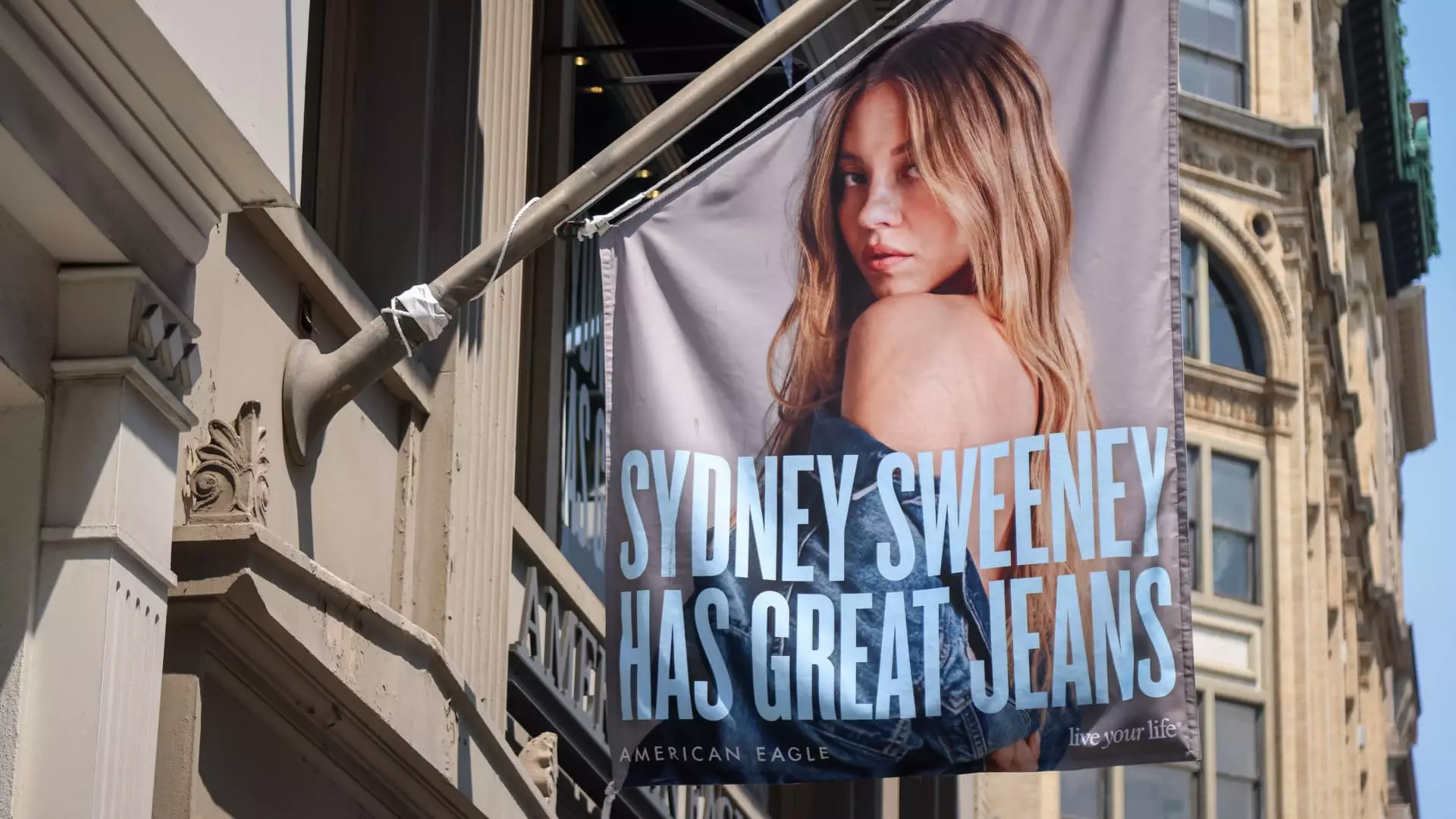In an era where social media reigns supreme, the influence of celebrities extends far beyond entertainment—to shape political narratives and consumer behavior alike. American Eagle’s recent marketing campaign, featuring actress Sydney Sweeney, demonstrates how harnessing celebrity status can dramatically affect public perception and stock performance. However, this strategy is fraught with peril, especially when it veers into controversial territory. The decision to align a marketing campaign with a politically active figure like Sweeney—who is publicly identified as a Republican—was a calculated gamble. While it aimed to tap into a specific demographic niche, it ran the risk of alienating other consumer segments and igniting social media backlash.
The response from President Donald Trump, who publicly praised the campaign and Sweeney’s role, underscores the current polarized climate. Trump’s endorsement acted as a catalyst, propelling American Eagle’s stock upward by more than 20%. Yet, this fleeting market boost highlights a dangerous oversimplification: the illusion that celebrity political endorsements are merely positive signals. In reality, they often oversimplify complex social issues and fray the fabric of consumer trust. When a brand risks entangling itself in political controversy, it becomes a pawn in a broader ideological battlefield rather than a neutral purveyor of fashion.
Such tactics may temporarily boost visibility, but they dangerously undermine the company’s credibility as an inclusive, universally appealing brand. By leaning into divisive politics, American Eagle risks becoming associated with a specific political ideology, which can alienate large portions of their customer base—particularly in a country where consumer values increasingly prioritize social justice, diversity, and authenticity.
The Perils of Marketing in a Fragmented Cultural Landscape
The American Eagle campaign drew widespread criticism—accusations that the slogan “Sydney Sweeney has great jeans” was a double entendre, veering into sexualization and superficial beauty standards. Critics argued that reducing Sweeney’s appeal to her physical traits perpetuated outdated stereotypes, especially in a social climate increasingly demanding authenticity and diversity. The company’s muted response—claiming that the slogan was about “the jeans”—felt dismissive and out of touch.
This disconnect exposes a fundamental flaw in marketing strategy: the failure to recognize the deep cultural shifts regarding gender, identity, and consumer empowerment. Brands that cling to traditional norms risk being perceived as tone-deaf relics, especially when younger, socially conscious consumers hold their purchasing power. Conversely, overtly progressive campaigns—like those involving “woke” culture—can backfire, as seen with high-profile missteps in brands like Bud Light. The tightrope walk for marketers is more precarious than ever, requiring an empathy that balances progressive values with genuine representation, rather than superficial or manipulative messaging.
American Eagle’s reluctance to address the controversy openly suggests a lack of strategic vision—dismissing a broader cultural critique in favor of simplistic branding. Ultimately, this approach damages the brand’s reputation for authenticity and may hinder long-term growth, despite temporary gains in search interest and market visibility.
The Illusion of Market Manipulation and Short-Term Gains
The recent jump in American Eagle’s stock is a textbook example of how market sentiment can be manipulated—even if unintentionally—by celebrity endorsements and media hype. Search interest for the brand reached levels unseen in decades, a clear sign of the campaign’s viral potential. However, this spike is unlikely to translate into sustainable revenue without genuine consumer trust.
Adding to the complexity, American Eagle has been struggling financially amid macroeconomic headwinds, including declining consumer spending, tariffs, and internal merchandising errors. Their decision to pull traditional sales guidance and write down millions in inventory indicates that their core business is fragile. The short-term rally driven by a celebrity endorsement and political praise masks these deeper issues, offering false hope that a splashy campaign can reverse fundamental systemic problems.
Historically, companies have fallen into the trap of believing superficial marketing stunts can compensate for strategic deficiencies. What this incident reveals is that while celebrity endorsements can generate buzz, they are an unstable foundation for actual growth. Real progress requires authentic engagement with consumers, transparent communication, and a focus on product quality and value—none of which are achieved through political flattery or sensationalism.
The Deep Cultural Divide and the Future of Consumer Loyalty
This case accentuates how delicate the balance is between appealing to a specific cultural demographic and maintaining universal brand appeal. American Eagle’s emphasis on a politically active actress and conservative slogans signals an attempt to court a particular audience—a move that could pay off in a polarized market but at the cost of alienating moderates and progressives alike.
In a democratic society that values diversity and inclusion, brands have a moral responsibility to foster respect rather than exploit cultural tensions for short-term gains. While some may argue that embracing certain political identities strengthens loyalty among like-minded consumers, it risks alienating others who feel dismissed or marginalized. The most sustainable approach, within a liberal democratic framework, is to promote a message of shared values—authenticity, individual expression, and mutual respect—rather than leveraging divisive politics.
The American Eagle situation underscores the importance of strategic integrity in marketing. When campaigns are driven by shock value, political bravado, or superficial stereotypes, they threaten to erode consumer trust. In the long run, the brands that succeed will be those who understand the nuances of a diverse society and prioritize genuine connection over manufactured controversy. The future of brand loyalty in this polarized world hinges on authenticity, not spectacle.


Leave a Reply